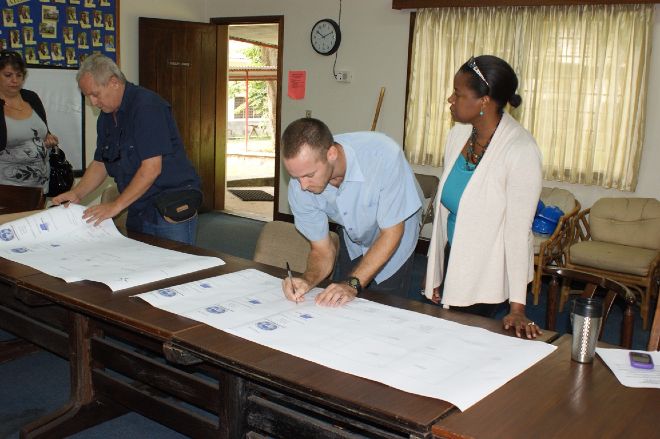Article by Kareen Laplanche, The American School of Kinshasa
I am a native of Haiti who now lives and works in sub-Saharan Africa, and an independent school business officer with degrees in architecture and urban planning. As the finance manager at The American School of Kinshasa (TASOK), which has students from 39 nationalities, I am fortunate to serve in a pivotal role that reconciles my experiences, education, training and background, all in a job that never bears a dull moment.
To illustrate: In 1996, after receiving my master’s degree in the U.S., I began a multidisciplinary career filled with intercultural exposure. I worked for small to large architecture firms in Haiti, city planning agencies in Arizona, and United Nations development agencies, including one in Port-au-Prince, Haiti. Over the course of this journey, I learned to connect the dots and understand the networks that are vital to sustainable communities.

How has this been useful in my role in a small school in the Democratic Republic of Congo? Everyone is connected, and yet everyone represents their own interest. When I worked for the U.N., one challenge was to find the balance between government actors, local communities, donors and experts in defining the need and implementing the right action. It was never easy, and while it was tempting to go for the donors’ interests, I learned that focusing on the recipients ensured a better outcome.
Similarly, at TASOK we have a board of seven, each representing a constituency of the school community. It requires a lot of effort to remain neutral, apply school policies and carry out decisions with short- as well as long-term impact for the benefit of our students. We cannot please everyone — but we can produce meaningful results.
My training in architecture and urban planning has also been helpful. Two years after I started at TASOK, my responsibilities stretched to include oversight of campus maintenance and the first phase of a campus renovation. These times were marked with intense discussion and planning with our U.S.-based architect, project managers and local contractors on a green and sustainable approach that would bring natural light and ventilation back into our classrooms.
In sub-Saharan Africa, we are faced with challenges of adapting to rapid development of technology, networking with schools in and outside of the region, and importing supplies from other parts of the world.
Being from a very small Caribbean country, I also appreciate TASOK’s diversity of cultures — and our privilege. The difference between the opportunities offered our students and less fortunate students in the DRC is huge. It is like living in a bubble in the middle of the city. It’s an honor to serve the children who pass through our school, and to ensure that the business office and related departments model the school’s vision of Excellence, Integrity and Inclusivity to all. We learn from everyone and accept the differences.
Finally, in sub-Saharan Africa, we are faced with challenges of adapting to rapid development of technology, networking with schools in and outside of the region, and importing supplies from other parts of the world. These challenges seem to intensify in the DRC. Succeeding in our operations requires us to constantly find creative solutions.
Working at TASOK requires that I stay fit in mind, spirit and body to embrace it all. To keep a sharp mind throughout the day, I pray, drink strong Haitian coffee (one mug keeps me energized until 2 p.m.!), and play tennis in the morning before coming to work. At 6:15 a.m., the city is still calm, and one can hear the birds. It’s never too hot to play in the morning. I also welcome every opportunity to walk and supervise work from one end of the 42-acre campus to the other. This allows me to breathe, relax, listen to nature's sounds and recharge for what comes next.
I enjoy my job despite the challenges and surprises that each day brings. I relish knowing that my training and background have come full circle in preparing me for all that I face at TASOK.
Kareen Laplanche is finance manager at TASOK, a day school in the Democratic Republic of Congo with 325 students in grades K-12.
Download a PDF of the article.


